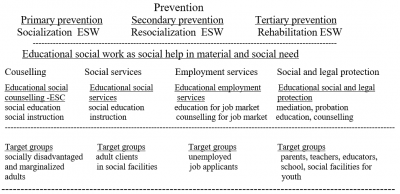Rozvoj a význam transverzálnych kompetencií ľudí v kontexte globalizácie
Abstract: In this paper we present the author´s innovative concept The educational social work, characterizes the social reality of people in the postmodern age which creates a new identity of social work and a new identity of social client. We based on the assumption that the most effective ways and means of social help is lifelong learning and social education of adults. Justifies the inclusion of the educational social work in the system of social work as the science and emphasize the practical necesity of educational social help to adults.
Key words: Educational social work, the educational social help.
Copyright © Mária Machalová : Concept of educational social work1
Abstrakt: V príspevku prezentujeme autorský inovatívny koncept Edukačná sociálna práca, charakterizujeme sociálnu realitu ľudí v súčasnej dobe, v ktorej sa formuje nová identita sociálnej práce a nová identita sociálneho klienta. Vychádzame z predpokladu, že najúčinnejším spôsobom i prostriedkom sociálnej pomoci je celoživotné učenie sa a sociálna edukácia dospelých ľudí. Zdôvodňujeme zaradenie edukačnej sociálnej práce v systéme vedy sociálna práca a zdôrazňujeme praktickú potrebnosť edukačnej sociálnej pomoci dospelým.
Kľúčové slová: Edukačná sociálna práca, edukačná sociálna pomoc.
Copyright © Mária Machalová : Koncept edukačnej sociálnej práce1
Introduction
The concept of educational social work as an innovative component in the system of social work as a social science, a field of study and social help is a result of our long-time theoretical as well as practical pedagogical work, research and also our firm belief that:
- Spiritual poverty results in material poverty, therefore it is essential for social work to demonstrate its identity as a science, a field of study and practical work also by projecting its social benefit in promoting social self-help of people in order to enhance their social and mental maturity and responsibility for their own life.
- Social work should be an efficient and real (not only proclaimed) support of social health, in other words the support of social communication and social relations enhancing social and mental integration and adaptation of people in their life environment that is both
provable and supported by tools available to social work; - The primary aim of social work does not consist of treating social problems and social
pathology, but it is supposed to be a real not only proclaimed social development program to support cultivating one´s social and individual potential.
The concept of Educational social work is based on a holistic approach in understanding of an individual, the social environment and their mutual dynamic relationship; a systematic approach in understanding one´s development as an individual system within the social environment and educational systems; a humanistic approach in understanding the content and importance of education as a way of social help, guidance to self-help and development of one´s potential. The concept thus represents an intersection of educational and counselling paradigms of social work.
The Educational social work concept is justified by the context of living conditions of people in today´s postmodern age. We felt that it is more than important to point out the mutual social determination of a man and society and thus highlight the mutual respect and responsibility of individuals, groups of people and society as a whole. What happens to one person is a private but at the same time public matter. It is not enough to offer people one-time social help. It is desirable to educate people and guide them to self-awareness and social self-help with the idea of enhancing one´s individual potential. The reason is clear, it is people where we need to search for the meaning of life and the source of change in their life. Only then can they struggle through life and use their gifts and talent.
The justification of the Educational social work concept
We have decided to open a scientific discourse for reflect our own professional opinion and look on the scientific and practical reality concerning the educational social work area of knowledge.
What is social work? The simplified answer could be: The science, research and practice in the social life of people focused on an individual when working on the social life micro level; focused on social groups and communities when working on the mezzo level; focused on social wholes (nation, state) when working on the social life macro level.
What makes the subject of social work as a science specific? What makes its theoretical reflection in people´s social life specific?
The attribute "social" may be found in the subject of several sciences, e.g. social philosophy, social anthropology, social science- sociology, social psychology, social pedagogy, social andragogy, social medicine, social biology, etc.
It means that the only difference between all the above mentioned sciences with the adjective "social" in their name, is a science problem. The science problem it is the centre of scientific and research interest of a particular science.
Social problem
A scientific problem in social work is a social problem – of an individual, social groups or social communities. A social problem is more or less difficult. In general it requires a complex solution as the same social problem is a matter of an individual but also of a certain social group they live in and a certain society they are citizens to, too. It means social problems always consist of more dimensions (they are multidimensional). Let us mention the following dimensions of one´s social problem: the dimension of spiritual and psychological experience, the dimension of social inclusion or exclusion, the dimension of various human activities - work, hobbies; the dimension of social roles – roles in family, at workplaces, in informal friends, neighbours, community groups, roles in public life, roles in formal groups at school, at workplace, in interest groups, political party; the dimension of health, the cultural dimension and others. (M. Machalová – P. Senko, 2018)
The social problem as the focus of the scientific, research, practical interest of social work has different causes (determinants) and different nature (aspects) in different people. Even if it looks like the same problem, it is not. For example the fact of being unemployed brings very different social problems to every unemployed person. When talking about an individual or group social problem, the causes and a person or a group that are the subject of a social problem must be carefully considered, i.e. different determination of a problem and thus different aspects of the social problem are considered.
Every social problem is usually caused by several determinants. If we take into consideration the fact that a specific person – a social client is a unity of spiritual, psychological, somatic and social aspects of human existence, their potential social problem is always a problem of "the whole person". A social problem of being unemployed can be presented not only as a change or loss of financial income but also disagreements in family life, worsened health status, mental disorders, deterioration in spiritual and mental level. One of the causes of social problems may be one´s personal, health, age or educational handicap.
An individual social problem is at the same time a spiritual and philosophical problem of a specific person since it regards their life values. And simultaneously, it is a health problem, because it regards a threat to one´s life and also a psychological problem as it involves one´s psyche, behaviour and actions. (M. Machalová – P. Senko, 2018.)
Social work
Taking into consideration the nature of a social problem, we presume the subject of the social work science has more dimensions. It can be perceived as a high complexity subject and into a certain extent as an umbrella subject of social work science, research and practice. The subject of social work can be defined as follows:
- The theoretical and methodological dimension of social work as an empiric science.
- The methodological dimension of social work, that is theory and methodology implementation.
- The practical dimension of social work.
The theoretical frame of a social problem ↔ research and practical method ↔ implementation in practice (implementation of a theoretical knowledge in social work practice in form of social help)
And vice-versa:
The implementation in practice (social help) ↔ research and practical method ↔ scientific reflection of a social problem (implementation of empiric knowledge in social work theory)
The theoretical knowledge of social work brought to a specific implementation of social help and the following empiric knowledge from social help put into the frame of theoretical knowledge lead us to the understanding that the helping process in social work involves several professionals from the field of social work as well as professionals from other science fields and helping professions.
All of them are united based on the main aim of social work, which is to provide preventative and rehabilitation social help to people in material and social need. Therefore it is questionable and counterproductive to expect social help to be provided solely by workers with the degree in the field of social work.
Providing social help involves social workers as well as professionals specialised in other important fields indispensable to providing various forms of social help: legal social help, medical and health social help, psychological social help, spiritual social help, educational social help, etc.
This fact is a result of social work as a science and practice. As we have already mentioned the subject of social work is multidisciplinary and is defined by interdisciplinary intersections. (For example educational social work is the intersection of the result of the social work and social education knowledge). The subject of social work is characterised by transdisciplinarity, so it outreaches the sciences entering social work and from which social work emerged.
Social work has its own theoretical, methodological and praxeological scientific potential. It needs to be pointed out that as a part of continuing process of emancipation of social work as a science, a field of study and social practice, social work uses also adapted methods of other sciences: political sciences, economic sciences, sociological sciences, spiritual sciences, philosophical sciences, psychological sciences, culturology, medicine sciences, legal sciences
The concept – Educational social work
This article presents the theoretical concept as the system of abstract ideas, theoretical constructs and indicators of educational social work and also as an aspect of its empiric reality. But the theoretical concept requires accuracy improvement and specification based on the operationalization of theoretical terms, which means achieving their maximum possible accuracy in connection with empiric reality.
The purpose of educational social work is to use educational activities to support development and cultivation of one´s creative potential in emergency social events and situations, to support a creative person. (Homo creans).
Social work is defined as a theoretical and applicative scientific discipline, a multidisciplinary profession and a practical social activity. Its task is to develop tools of efficient social help for individuals, groups, communities. Social work is considered a multidisciplinary area of the scientific knowledge, a research area and a specialized practical activity.
A. Tokárová (2003, p.52) is of the opinion that "transdiciplinarity is an attribute characteristic for sciences that are open to accepting knowledge of other sciences able to process, transmit and transfer innovated knowledge of other sciences not only those they originally drew impulses and knowledge from."
The attributes of social work follow the trends in the development of social work as a science and also "from the complexity of social dynamics and multifactorial conditioning of practical problems that are the subject of its research and at the same time the object of social work as a professional activity." (A. Tokárová – A. Matulayová, 2008, p.111.)
The concept of educational social work expresses
- The reflection of how theoretical and empiric aspects of social work get intertwined with its auxiliary educational sciences such as social pedagogy and social andragogy. We assume that social work as a science shows potential for cooperation with various other sciences as the knowledge and methods intertwine. In general, (A. Tokárová, 2008, p.111) firstly an independent theoretical concept, in our case educational social work is formed and the concept may then be established as a social work branch.
- The reflection of how social work practical activity and education get intersected – in other words the intertwining of educational instructional and counselling activities with the reality of social work practice.
- The reflection of how social work is diversified and subsystems are created. One of them is the subsystem of educational social work. The theoretical and practical anatomy of educational social work is created on basis of the social function of adult education.
The diversification happens as a result of a high variability and multicausality of social events, situation and problems in society.
Educational social work enters the social work system as follows
The theory of educational social work as a subsystem of the social work as a science.
Methodology and methodics of educational social work as a subsystem of social work research.
Practical activity of educational social activity as a subsystem of the social work practice.
Educational social work is presented by participating on solving social events and problems of people in stages of their: identification, prevention, solution and the assessment of the efficiency of the solution. Educational social work comes in different forms (M. Machalová, 2013, 2014):
- Preventative educational social work – as a specialized support of primary prevention (social education, awareness).
- Socializing and re-socializing educational social work – as a professional support of secondary prevention (social education, educational social counselling, sociotherapy).
- Rehabilitation educational social work – as a professional tertiary prevention support (social after-care, self-help groups and activities)
The algorithm of the implementation of educational social work:
Indication ↔ prevention ↔ suggestions of solution ↔ intervention ↔ assessment of people´s social problems solutions, through targeted activities and within the lifelong social education and lifelong educational social counselling is according to us one of many thought processes used in creating a theoretical background forming a base for the creation of educational programs focused on potential and real clients of social help and social services. From the individual point of view, the content and tolls of social help within the scope of educational social work are related to the fact that people´s life has a social aspect and requires them to adapt constantly through learning. This should be stimulated by educational social programs. The influence of social education (education, instruction, counselling) in social help and social services cannot be ignored as any form of solving material or social need represent an intervention into social and mental adaptation of people as well as the integrity of social client´s personality. The use of educational tools is usually an experiment aimed at correction and change of the client´s personal attitude towards their life situation, social event, social problem. From the social point of view, education is a systematic help to people. Education has also always played a key role in socialization, personalization and enculturation of people.
The purpose of educational social work
The concept of educational social work is the outline of (M. Machalová, 2013, 2014):
an innovative kind, content and methods of processes of education and instruction in social work. The starting point is the fact that a person is a permanently developing system that lives and presents as a whole and unity of:
The body ↔ Psyche (experiencing and action) ↔ Spiritual aspect (meaning of life) ↔ Social aspect (communication and relationships).
The purpose of educational social work from the client´s point of view is:
Social help to clients ↔ Guiding clients towards self-help ↔ Development of each client´s individual potential.
Educational influence, instruction and counselling strive to achieve spiritual, mental, psychological and social maturity of people, i.e. to achieve an individual level of one´s rational, emotional, value and social competences and maturity.
Psychological maturity, which means spiritual, mental and social maturity is reflected in one´s behaviour and actions. It is seen in the way one copes with social stress situations psychologically.
The task of educational social workers is to guide and accompany social clients towards their self-help if a social client asks for it because they feel to be socially endangered by being exposed to what they perceive as unbearable social deprivation, frustration, social conflict and stress.
Pic. 1: Educational social work as prevention as the social help for the adults (copyright M.Machalová, 2013, 2014)

The concept of educational social work includes the intertwining of:
Social reality and educational reality; social environment and educational environment; social processes and educational processes. It emphases the social function of education which is connected to the social development of people and their personal development.
Conclusion
The basis for social prevention within educational social work is the fact that a social problem is oftentimes a visible consequence of a handicap in a social client´s education therefore a social problem is bound to be educationally determined. The solution will depend on the revitalization of the client´s educational needs, on the "tailored" education of a client and the quality of educational environment.
The point of the theoretical concept of Educational social work and its efficient implementation in educational social practice will be visible when social clients, having undergone educational activities, realise the need to change and start to act so that they could achieve the desirable social change in their lives. It is good to lead people to accepting their share of responsibility and motivate them to take initiative and be active. The following words by the philosopher Seneca may express the reason for a personal and social change: "Throughout the whole of life one must continue to learn to live."
Author: Prof. doc. PhDr. Mária Machalová, PhD.
Note:
Prof. - of Social work
Doc. - of Andragogy
PhDr. and PhD. - of Psychology
Bibliography
MACHALOVÁ, M. 2013. Preventívna sociálna práca - Edukačná paradigma v sociálnej práci. Prešov : Prešovská univerzita, 2013. 272 p. ISBN 978-80-555-0932-7.
MACHALOVÁ, M. 2014. Edukačná sociálna práca. Prešov: Prešovská univerzita, 2014.
326 p. ISBN 978-80-555-1118-4.
MACHALOVÁ, M. – SENKO, P. 2018. Životný obrat človeka z pohľadu biodromálnej psychológie a Autentické životné príbehy. ( Life´s turn - From Biodromal psychology point of view and The authentic life stories.) Bratislava: Inštitút výchovy a športu a Prohuman.sk. 319 p. ISBN 978-80-972795-2-3.
TOKÁROVÁ, A. (et al.) 2003. Sociálna práca. (Kapitoly z dejín, teórie a metodiky sociálnej práce.) Prešov: Akcent Print, 2003. 573 p. ISBN 80-96836758.
TOKÁROVÁ, A. – MATULAYOVÁ, A. (eds.) 2008. Sociálna pedagogika, sociálna práca a sociálna andragogika – aktuálne otázky teórie a praxe. Prešov: Prešovská univerzita, 2008, s. 111.
1 The concept of Educational social work the author of this article published in these monographs:
MACHALOVÁ, M. Preventívna sociálna práca - Edukačná paradigma v sociálnej práci. (Preventive social work - Educational paradigm in social work.) Prešov: Prešovská univerzita, 2013.
MACHALOVÁ, M. Edukačná sociálna práca. (Educational social work.) Prešov: Prešovská univerzita, 2014.























